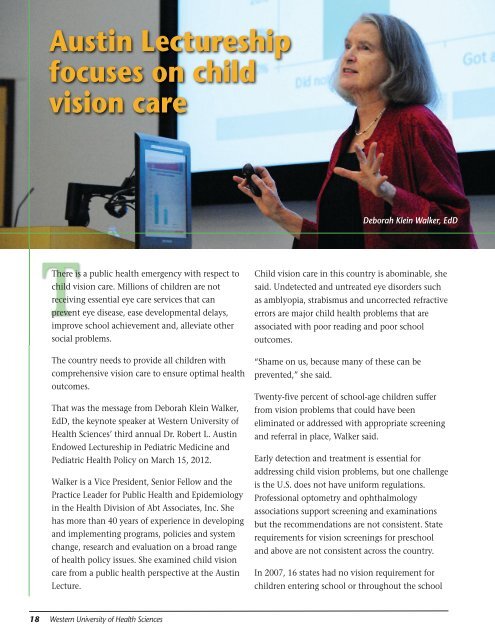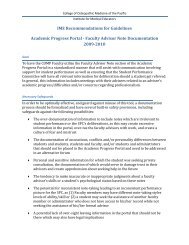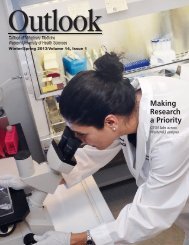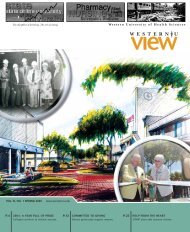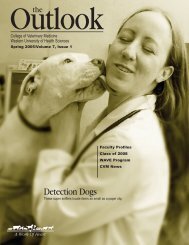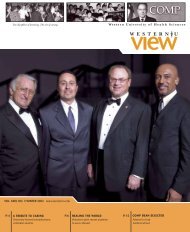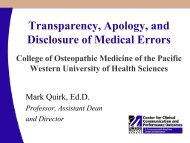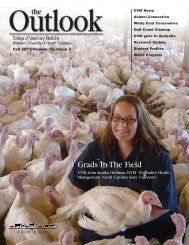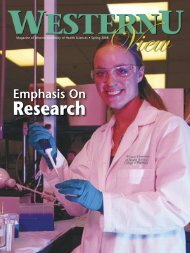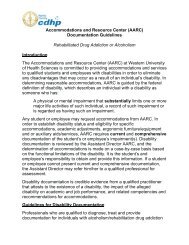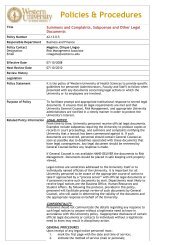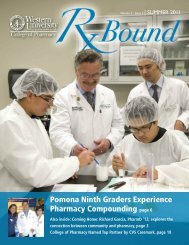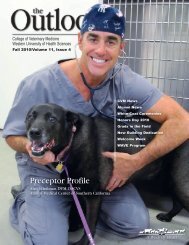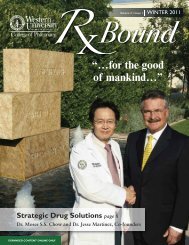Austin Lectureshipfocuses on childvision careDeborah Klein Walker, EdDThere is a public health emergency with respect tochild vision care. Millions of children are notreceiving essential eye care services that canprevent eye disease, ease developmental delays,improve school achievement and, alleviate othersocial problems.The country needs to provide all children withcomprehensive vision care to ensure optimal healthoutcomes.That was the message from Deborah Klein Walker,EdD, the keynote speaker at Western University ofHealth Sciences’ third annual Dr. Robert L. AustinEndowed Lectureship in Pediatric Medicine andPediatric Health Policy on March 15, 2012.Walker is a Vice President, Senior Fellow and thePractice Leader for Public Health and Epidemiologyin the Health Division of Abt Associates, Inc. Shehas more than 40 years of experience in developingand implementing programs, policies and systemchange, research and evaluation on a broad rangeof health policy issues. She examined child visioncare from a public health perspective at the AustinLecture.Child vision care in this country is abominable, shesaid. Undetected and untreated eye disorders suchas amblyopia, strabismus and uncorrected refractiveerrors are major child health problems that areassociated with poor reading and poor schooloutcomes.“Shame on us, because many of these can beprevented,” she said.Twenty-five percent of school-age children sufferfrom vision problems that could have beeneliminated or addressed with appropriate screeningand referral in place, Walker said.Early detection and treatment is essential foraddressing child vision problems, but one challengeis the U.S. does not have uniform regulations.Professional optometry and ophthalmologyassociations support screening and examinationsbut the recommendations are not consistent. Staterequirements for vision screenings for preschooland above are not consistent across the country.In 2007, 16 states had no vision requirement forchildren entering school or throughout the school18 Western University of Health Sciences
years. Most states require some vision screening inpublic school settings but do not set standards forscreenings or follow up, Walker said.Those people with the biggest unmet need gaps arethose in racial and ethnic minority groups, lowerincomehouseholds, and households with noinsurance. Twenty-three percent of kids withouthealth insurance for more than a year had unmetvision care needs as compared with 5 percent ofchildren who were insured for a year or more, Walkersaid.The country needs to act to ensure all children getcomprehensive services, she said. To this end, Walkerrecommends a uniform standard of care for allchildren from birth through adolescence. This requirespublic health experts andclinicians to work together.“Public health is thecatalyst, the convener,” shesaid. “Public health can donothing without reallyoutstanding clinicians, butclinicians need to work withpublic health and vice versaand all be part of oneteam.”To build a comprehensive child vision care system,Walker recommends:• Including child vision health in key pieces oflegislation at the federal and state levels.• Ensuring adequate comprehensive coverage ofchild vision care services by all public and privateinsurers and payers.From left, Gloria Austin, Debra Klein Walker, andCollege of Optometry Dean, Elizabeth Hoppe• Developing a national set of children’s visionguidelines for screening and examinations andensure that these guidelines are adopted by allstates in school health codes and mandates• Implementing and funding a nationalclearinghouse or center for child vision health• Enhancing and fully funding an ongoing nationalcampaign to make people aware of childhoodvision problems.• Developing and facilitating a broad coalition ofchild-oriented stakeholder groups to work towardthe establishment and maintenance of acomprehensive child vision system across thecountry.Any time you want to change something, you needthree things: a knowledgebase, social strategy andpolitical will, Walker said.“The problem is today inmany areas, especially inchildren’s health, we have afantastic knowledge base butwe don't act on it,” she said.“You need both socialstrategies in how to do it, andyou need political will. Itneeds to come from all of us, especially people whoare really committed to child health coming together.”The Austin Lectureship is presented by Clinton E.Adams, DO, FAAFP, FACHE, dean of the College ofOsteopathic Medicine of the Pacific (COMP), and byElizabeth Hoppe, OD, MPH, DrPH, dean of the Collegeof Optometry.• Ensuring a “point of accountability” in the U.S.public health system through the establishmentof a child vision health categorical programlinked to the Title V Maternal and Child HealthBlock Grant.• That each state hire a child vision carecoordinatorThe lectureship was established in Austin’s memory byhis wife, Gloria, their children, Charles, Douglas andLynette, and their families, and is designed to honorand perpetuate his lifelong love of medical practiceand his pursuit of pediatric knowledge in the healthprofessions. He was a faculty member at COMP untilhis retirement in 1981. – Rodney TanakaWesternU View Summer 2012 19


